
6 Tips To Avoid Incoming Threats To Your Systems
When dealing with threats, putting up protection to keep threats at bay is good. But do you know what is better than that? Prevention or practicing preventive measures to avoid something bad to happen. Especially when you are handling IT systems, which definitely needs all eyes on from every company’s team. Nowadays, threats—or popularly called cyber threats—are getting stronger and evolving, coinciding or keeping up with the exponential growth of our technology. Businesses and companies around the world have been hounded continuously by cyber threats, such as phishing, malware, hacking, data breaches, ransomware, and many more. But thanks to multiple security measures, they were able to prevent or recover from cyberattacks.
Hackers will do anything. Yes, they do. Even if it means not sleeping for days just to penetrate the highest form of systems security a company possesses. Stealing sensitive information such as personal details or credit card information, selling or trading them to the highest bidder, is their livelihood. They are also becoming more sophisticated as the years go by, employing different methods of attacking companies’ computer networks, big or small.
Thanks to the IT gods, if there are, avoiding cyber threats isn’t that difficult to do even for a non-tech-savvy person. Just follow these six useful tips and you will be smiling the cyber threats away in no time.
Install anti-virus software and firewall protection.
There are lots of anti-virus software that can be found online or in shops. Make sure that when you purchase one, it can guarantee you 100% full security or it is reputable anti-virus software. Read reviews about the product to know what you’re getting. This is a very simple tip, yet it can help your computer system be safe and it starts from here. Put up a firewall also, as these two are the first line of defense to your computer system. Don’t forget to ensure that the anti-virus software is installed on all computers within your computer network.
Keep all systems updated.
Being updated to the latest version of your anti-virus software is key. Keep it updated even if you have to pay for it. It’s worth the expense because if you keep on running the outdated version, chances are you won’t even know that your system is already infected, or the software doesn’t have the right solution for the threat or damage. Then this will totally lead you to spend even more money just to recover everything. As a business owner, you don’t want that on your plate. Also, anti-virus software functions at its maximum when it is up-to-date.
Use pop-up blockers when online.
Pop-up ads have been very common for us and once you click it, it’s either more and more pop-ups would sprout on your screen or a prize for something you didn’t do is offered. When you’re completely immersed deeply on the internet or working online then all of a sudden, these ads would disrupt your work continuity, it’s a pain in the neck and very frustrating. On top of all that, pop-ups can unleash a nasty computer virus on your whole computer system or network. The solution? A handy pop-up blocker can stop these cyber-security attacks while you’re working online. You will notice a pop-up is blocked right away on the address bar of your browser, showing a browser icon with a red X mark.
Develop an Information Security Policy.
A very critical step in securing a company’s systems and data is through developing an Information Security Policy wherein ensuring the information security will receive the profile it requires and is compliant with certain standards. And this needs support from the higher-ups of a company, or else it won’t be effective, and all efforts will just go down the drain. Under an Information Security Policy, all users should be made aware of their roles and responsibilities while still employed by the company.
Regular logs and systems monitoring.
Performing daily scans on your network and systems log greatly helps in maintaining your computers, data, and network uninfected or undamaged. Monitoring is important in detecting unusual activity in your computer network, especially in a company that has a vast IT infrastructure to handle. Logs for devices that are connected to your network should also be scanned to ensure endpoint data are protected.
IT Team.
Prevention is better than cure, and this saying is proven. Hire an IT expert or IT support team from any reputable IT company. IT professionals know most about security systems than any other individual and they are the best at protecting your data and network. They will help you in anything involved with IT, like if you’re company is currently using Microsoft Office 365, that is the best there is today. They will fortify your defenses against any cyber threats and will let you manage your business more rather than having to deal with IT stuff altogether.
Recent Posts
- How Does GPON Improve Network Efficiency?
- What Are The Advantages Of GPON?
- What Are The Benefits Of IT Outsourcing?
- What's The Deal With Ransomware Attacks?
- Are GPON Providers Widely Available?
- What's GPON's Impact On Bandwidth?
- Why Is Multi-Factor Authentication Important?
- How To Ensure Data Privacy Compliance?
 Blogs
Blogs Infographics
Infographics Videos
Videos Podcasts
Podcasts Case Studies
Case Studies Call For Quote
Call For Quote